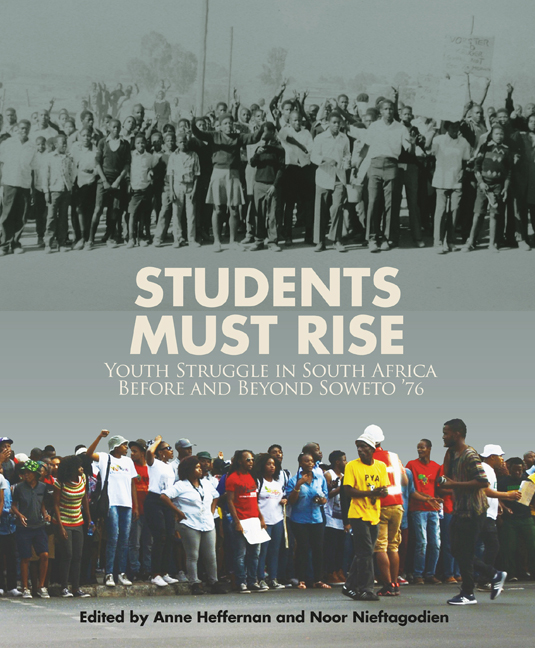Book contents
- Frontmatter
- Acknowledgements
- Contents
- Timeline
- Map Of South Africa
- Glossary
- Abbreviations
- Introduction: narratives of the student struggle
- Chapter 1 A brief history of the African Students’ Association
- Chapter 2 Youth and student culture: Riding resistance and imagining the future
- Chapter 3 The role of religion and theology in the organisation of student activists
- Chapter 4 Student organisation in Lehurutshe and the impact of Onkgopotse Abram Tiro
- Chapter 5 The University of the North: A regional and national centre of activism
- Chapter 6 Action and fire in Soweto, June 1976
- Chapter 7 What they shot in Alex
- Chapter 8 SASO and Black Consciousness, and the shift to congress politics
- Chapter 9 Youth politics and rural rebellion in Zebediela and other parts of the “homeland” of Lebowa, 1976–1977
- Chapter 10 My Journey, our journey: Activism at Ongoye University
- Chapter 11 ‘Let's begin to participate fully now in politics’: Student politics, Mhluzi township, 1970s
- Chapter 12 ‘They would remind you of 1960’: The emergence of radical student politics in the Vaal Triangle, 1972–1985
- Chapter 13 The ends of boycott
- Chapter 14 Fighting for ‘our little freedoms’: The evolution of student and youth politics in Phomolong township, Free State
- Chapter 15 ‘Every generation has its struggle’: A brief history of Equal Education, 2008–15
- Chapter 16 Contemporary student politics in South Africa: The rise of the black-led student movements of #RhodesMustFall and #FeesMustFall in 2015
- Selected Bibliography
Chapter 16 - Contemporary student politics in South Africa: The rise of the black-led student movements of #RhodesMustFall and #FeesMustFall in 2015
Published online by Cambridge University Press: 21 April 2018
- Frontmatter
- Acknowledgements
- Contents
- Timeline
- Map Of South Africa
- Glossary
- Abbreviations
- Introduction: narratives of the student struggle
- Chapter 1 A brief history of the African Students’ Association
- Chapter 2 Youth and student culture: Riding resistance and imagining the future
- Chapter 3 The role of religion and theology in the organisation of student activists
- Chapter 4 Student organisation in Lehurutshe and the impact of Onkgopotse Abram Tiro
- Chapter 5 The University of the North: A regional and national centre of activism
- Chapter 6 Action and fire in Soweto, June 1976
- Chapter 7 What they shot in Alex
- Chapter 8 SASO and Black Consciousness, and the shift to congress politics
- Chapter 9 Youth politics and rural rebellion in Zebediela and other parts of the “homeland” of Lebowa, 1976–1977
- Chapter 10 My Journey, our journey: Activism at Ongoye University
- Chapter 11 ‘Let's begin to participate fully now in politics’: Student politics, Mhluzi township, 1970s
- Chapter 12 ‘They would remind you of 1960’: The emergence of radical student politics in the Vaal Triangle, 1972–1985
- Chapter 13 The ends of boycott
- Chapter 14 Fighting for ‘our little freedoms’: The evolution of student and youth politics in Phomolong township, Free State
- Chapter 15 ‘Every generation has its struggle’: A brief history of Equal Education, 2008–15
- Chapter 16 Contemporary student politics in South Africa: The rise of the black-led student movements of #RhodesMustFall and #FeesMustFall in 2015
- Selected Bibliography
Summary
The 2015 October student uprisings in South Africa, organised around the hashtag and demand that #FeesMustFall (also #EndOutsourcing and #NationalShutDown), have been compared to the student uprisings of June 1976 when thousands of youth took to the streets to protest against the apartheid government's insistence that Afrikaans be a compulsory medium of instruction in schools. While the June 1976 and the October 2015 student uprisings were organised around what can, on the surface, be understood as a single issue, these large-scale protests also wanted larger demands to be met. The students of 1976 were resisting the unequal and segregated school and societal system of apartheid and in 2015 students were resisting the commodification of education by calling for free, quality, decolonised education and expressing dissatisfaction with the rate and depth of change two decades after South Africa's democratisation. Youth were critiquing the institutional racism and the racialised oppression that have persisted across South Africa, making it arguably the most unequal country in the world currently.
Comparing the recent 2015 uprisings to the 1968–69 period seems appropriate as that was the year that Steve Biko and others formed the South African Students’ Organisation (SASO). Out of this radical black student organisation came the politics and philosophy of Black Consciousness (BC), which encouraged self-reflection and the centering of the black self, and insisted on a Pan-African outlook. In its early phases it critiqued the education system in South Africa and fought for the improvement of higher education for the black student. It also developed its own organisational practices and structures and a political education programme (known as Leadership Training programmes for university students and Formation Schools for high school students and community members) for its members. There was a significant change in thinking about education and society from 1969 onwards, when SASO stopped fighting for “equality” in education, or education equal to white education, and started criticising white, privileged education as a domesticating or dominating education.
The last few years have seen a re-emergence of BC and Pan-Africanism at universities through a range of student formations. The demographics of universities, particularly the historically-white institutions like the University of Cape Town (UCT), Rhodes University, University of Pretoria and University of Stellenbosch, have changed significantly since black students were allowed into all universities. At some universities this has meant that black students make up the majority of students on campus.
- Type
- Chapter
- Information
- Students Must RiseYouth struggle in South Africa before and beyond Soweto ’76, pp. 180 - 190Publisher: Wits University PressPrint publication year: 2016



